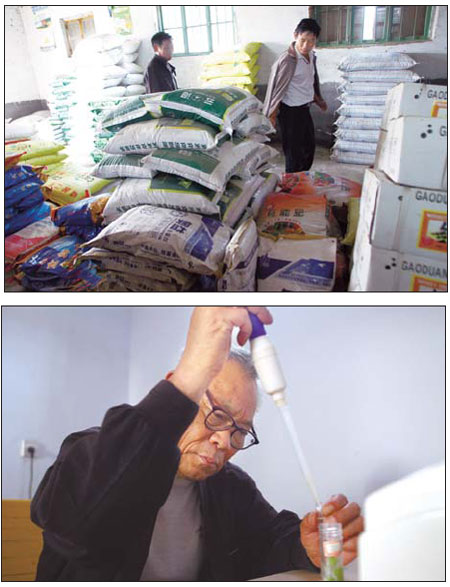Pesticides bring a silent spring
Updated: 2011-10-19 14:03
By Yang Wanli (China Daily)
|
|||||||||||
|
Top above: Fertilizers and other farm chemicals are available in this small store in Shouguang, Shandong. Above: A tester checks a Nanfan cucumber for chemical residue. According to protocols, he should be wearing gloves. [Photo/ China Daily] |
Important interval
For modern agriculture, chemicals including fertilizers seem to be unavoidable not only in China but also in other countries. But their potential for harm can be mitigated by generally agreed-upon good agricultural practices (GAP). Practices vary by jurisdiction, but China's GAP took effect in May 2006.
 |
For example: To extend their effectiveness, some pesticides contain chemicals that keep them from easily being washed away by rain. It takes time for those chemicals to break down into harmless compounds, so it's important to use minimal amounts and to allow sufficient time to elapse between the last application and harvest.
"We called it the pre-harvest interval, which is an important part of GAP," said Pan, the quality testing and inspection director. "Only by following GAP strictly can we enjoy safe agriculture products."
Pan said more than 96 percent of vegetables in China meet safety standards for chemical residue. Those that do not result from failure to follow GAP principles. "The problem not only exists in China, but also in advanced countries," he said.
Daily tests
Shouguang, in Shandong, is the "vegetable city" of China. About 60 percent of its cultivated land is devoted to growing vegetables, and it produces about 4 billion kg of them each year.
It also has taken the lead in promoting safer farming by cracking down when tests show that residues of farm chemicals exceed 50 percent. Levels above that amount indicate that either too much was used or the chemicals were applied too close to harvest.
"Almost all villages in Shouguang have a testing office and technicians will do the test every day," said Fan Quande, the Nanfan village chief. "If any hypertoxic chemicals are found on vegetables, the whole plastic greenhouse should be destroyed and farmers who grow those vegetables will be detained."
In fact, he said, 10 greenhouses were destroyed and six farmers in the village were punished in the past two or three years.
Nanfan village has about 400 families and each owns a greenhouse that covers about 1,000 square meters. Fan Jiude, 46, grows cucumbers that bring his family 40,000 to 50,000 yuan a year, he said.
"In recent years, no highly toxic pesticides have been sold in the market and we dare not use them because of the severe punishment," he said.
Fan, who has grown vegetables for more than 25 years, knows about other risks. "The hypertoxic pesticides are so strong that once I was poisoned in the greenhouse, just because I wiped away sweat after spraying without washing my hands. It made me throw up and I stayed in a hospital for three days."
According to the most recent statistics available from the Ministry of Health, more than 17,000 pesticide poisoning cases in rural areas were reported in 2000, and more than 1,000 people died. About a quarter of the poisoning cases happened during farmwork.
Leak in the system
In Fan Jiude's greenhouse, some small plastic bags lay on the ground, empty containers for chemical fertilizer he uses to make his cucumbers grow larger. The instructions on the back of the bag said the contents should be diluted 1:15 - one part fertilizer to 15 parts water. Fan said he uses only 10 parts water.
In the village's agricultural testing office, the man conducting the tests is supposed to wear gloves and use tweezers when he cuts rind from a cucumber to test for chemical residue. He had neither but, when prodded by the village chief, used scissors instead of tweezers. But he said he does wash containers after each sample is tested and uses distilled water - both parts of the protocol - so the results can be trusted.
"That's where the problem is," said Jiang, the botany researcher. "Public sectors are speeding up to build a safe system, but the effect still lags behind. It takes time to educate farmers and to run the system well in the grassroots units."
Sun Jingbo and Wang Jing contributed to this report.
Related Stories
Pesticide use rules to be revised 2011-07-25 13:35
Govt to ban 10 varieties of toxic pesticide 2011-07-08 14:31
- China warns of 'grim situation' in foreign trade
- Corruption still rife in construction industry
- Scandals put a big dent in donations
- China's FDI rises 16.6% in Jan-Sept
- Angry Birds to land in Shanghai
- Rare earths to become even rarer
- LeTV, Tudou to set up JV
- China Eastern cancels order for Boeing 787s











